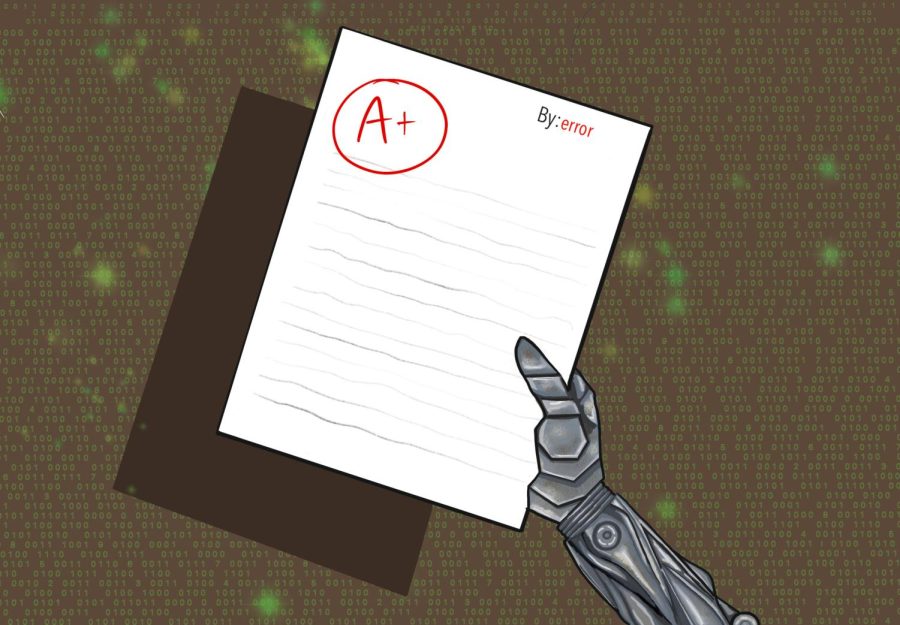ChatGPT Poses a Threat to the Future of Writing and Academics
February 21, 2023
Dystopian media has long portrayed an ominous future in which technology becomes advanced enough to overshadow the accomplishments of humans. And while this reality has always seemed distant, coming into 2023, rapidly developing technology has begun to suggest that that world might not be as far in the future as it seems.
In November of 2022, OpenAI, a San Francisco-based Artificial Intelligence (AI) research and deployment company, launched a groundbreaking new program called the Chat Generative Pre-trained Transformer (ChatGPT). Based upon their pre-existing language model (a type of AI model that can predict the next word(s) in a text), ChatGPT is able to generate human-like text by relying on human input and feedback to produce essays, stories, poems, lyrics, recipes and more. When placed side by side with something genuinely created by a human, the AI-generated text is nearly indistinguishable.
The introduction of ChatGPT and other advanced AI technologies represents a new era for humanity: one in which human work can be easily mimicked or sometimes even replaced. Naturally, this reality brings dread to those of us who worry that the new technology might make our own work obsolete. As someone interested in a writing-based career, ChatGPT poses a considerable threat to my future.
It also leads to concerned educators, who suspect that given the opportunity to have an AI write for them, students will be less inclined to complete their assignments themselves. For that reason, the development of advanced AI technologies poses a major threat to education. If people can easily get away with having someone else do their work, they won’t hesitate to seize that opportunity. That reality makes me wonder how effective English classes will be in the future if students aren’t applying concepts themselves. Does a future with ChatGPT mean that writing skills will significantly decrease? It’s a serious possibility.
John Rauschuber, a Pali social studies teacher, said he is wary of what the introduction of ChatGPT might mean for instructors as well as students.
“One of my goals as an educator was always to get kids to create,” said Rauschuber, who teaches philosophy. “[ChatGPT] presents a huge obstacle to that. It really raises the question of, what is my purpose as an educator, now that AI can create?”
Rauschuber shared that in trying out the new program, he was surprised by how well it produced writing.
“I put in some AP government questions to see what type of answers it would provide me with, and I was really surprised at the quality of the response,” he said. “Its nuance and ability to get both sides of the argument was pretty impressive.”
This scared me, mainly because I had previously been relying on the idea that ChatGPT was not yet at the ability level of a human to quell my worries. I still wanted to hold onto that reassurance as much as possible, so I created a small goal of finding as many mistakes as I could in order to make myself feel a bit better about the new technology.
Experimenting with ChatGPT, I found two flaws. First, the program is incapable of writing a poem that does not rhyme. I asked it dozens of times in countless different ways, but each time that I addressed its mistake, it would apologize, then generate yet another rhyming poem that did not fulfill my request. The second shortcoming I found was that the information ChatGPT was trained on doesn’t reach past the year 2021. Because of that, it has no access to new developments or events from the past two years and cannot comment on current events or new technology/media in general.
I find it gratifying to identify flaws in the program, as they remind me that it isn’t able to accomplish exactly what a human can just yet. That said, I know that as technology advances, so will ChatGPT. The shortcomings that I noticed were relatively minor, and with time, they’ll likely go away. Alas, my fear of the future remains.
Randy Tenan-Snow, one of Pali’s AP English Language teachers, also noticed flaws in the writing that she generated. She was assured that the program doesn’t yet have the same abilities as that of a human.
“It gives an organized essay with some textual examples, but it’s not as in-depth,” Tenan-Snow said. “I would have graded it a C or C minus.”
“It doesn’t have the embellishment or the writing voice,” she added.
These flaws reassure us that human creativity and input is still incredibly valuable and that innately, humans have abilities that AI does not. However, as AI technology and large language models like the one ChatGPT is based upon rapidly develop and improve, a wariness of the future and the inevitable improvement of these programs lingers. While the technology might not be able to perfectly replicate a human yet, it’s clear that a future in which it can is not so far away. For that reason, the prospect of ChatGPT remains terrifying; five years from now, there’s no telling how intelligent these AI programs will become.
While many teachers are worried about ChatGPT being used in their classrooms, others are more open-minded.
Tenan-Snow said that she has accepted the reality of this new program and wants to embrace it in her classroom, rather than try to find ways to stop her students from using it.
“[In my class], I’m really working on what we can do to develop writing, develop our voice, develop thinking,” she said. “And so, sure, people are cheating, but I’d like to introduce [ChatGPT] in my class, like, ‘let’s see what we can do with this,’ rather than make it some secret thing.”
Tenan-Snow’s perspective is reasonable, and it’s most likely the best way for people to approach this new technology. While ChatGPT is scary, it’s also inevitable, and it will only continue to grow and improve. With that reality in mind, all that we can do is embrace it and attempt to incorporate it into our everyday lives in a way that doesn’t take away from our jobs and abilities as humans.
That said, cheating is still an obvious concern, and it’s evident that something has to be done to combat it. Pali’s administration and teachers are in the process of figuring out how they’re going to address this unprecedented obstacle that has suddenly been introduced into their classrooms.
“Right now, we are in major discussions in our grade-level Professional Learning Communities about how we want to use it,” Tenan-Snow said.
At the time being, no specific decision has been made. However, there seems to be a common thread of people recognizing both the threat that this new program poses to academic integrity and the opportunities for learning that it provides. Ultimately, it will be up to Pali’s staff to decide how they plan to address the issue of ChatGPT. The one thing that surely everyone can agree upon is the fact that the program represents a new era and a rapidly developing world.
“We’re in a new age,” Rauschuber said. “[ChatGPT] is definitely a game changer.”












